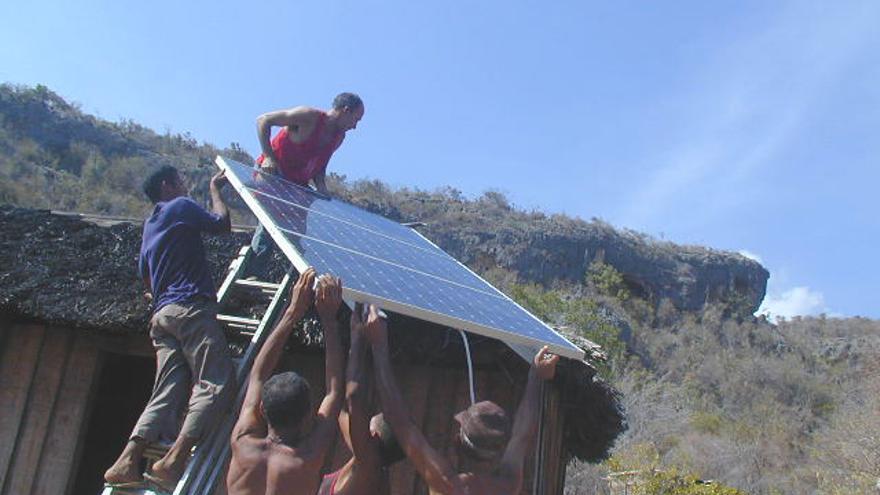
![]() 14ymedio, Havana, July 29, 2021 — In the midst of a pressing electricity shortage, the Cuban government has taken a step demanded by the population to authorize the duty-free import of photovoltaic systems, including parts and pieces of panels that generate energy by direct transformation of sunlight into electricity.
14ymedio, Havana, July 29, 2021 — In the midst of a pressing electricity shortage, the Cuban government has taken a step demanded by the population to authorize the duty-free import of photovoltaic systems, including parts and pieces of panels that generate energy by direct transformation of sunlight into electricity.
The resolution, published this Wednesday in the Official Gazette, allows the populace to purchase these products abroad as long as the purposes are not commercial. That is, Cubans who generate electricity must dump the surplus of their personal consumption into the National Electric System so that it may be distributed among the rest of users.
The document specifies that the panels, the inverter, the support structures, the electric boards, the cabinets for parts, and the grounding system are considered essential parts and pieces, therefore they are exempt from customs payment.
The rest of the components — direct and alternating current buffers, batteries for energy storage, electric conduit, battery charge regulator, and system components and electrical accessories for assembly — are considered common use and are subject to the usual tax rates.
The Gazette establishes that the person who acquires the panel will be responsible for the system and its maintenance, in addition to re-contracting the service to the Electric Utility, which must certify that the requirements for installation are met and verify the meter for energy measurement.
The tax exemptions have been approved, argues the text, “with the aim of increasing participation of renewable energy sources on the electric power generation grid.”
In 2019, through Decree Law 345, the sale of surplus electricity generated by private producers from this type of source was authorized, but the provision did not modify the state monopoly of the Electricity Union, the only one authorized to buy, distribute, and commercialize energy of private origin.
The Cuban Electricity Union (UNE) specified that an average household on the island needs around 185 kWh per month. To cover these needs, 5 solar panels of 260 watts are necessary.
The importation of tax-free solar panels was in high demand by those who are eager to supply their own electricity, an increasingly precarious good on the Island. Depending on the power, the rates (before the Tarea Ordenamiento* [Ordering Task] took effect) ranged from 200 to 1,000 pesos for panels generating from 900 watts to 15 kilowatts.
In March, the authorities began to pitch the idea of bonuses or exemptions for those who wanted to import panels. But the blackouts, which have increased this summer, when municipalities throughout the Island have seen their number of hours of electricity regulated, and the historical protests in more than 40 cities on the island, may have accelerated the decision.
To date, the panels available in Cuba were sold through the state virtual store Bazar Virtual, where 270-watt installations could be found, at a cost of $2,549.
Most of the solar panels on the Island, due to the high cost involved, are in the hands of the State and have been donated by China. The announcements by two companies — Spanish and German — that wanted to install these devices in several Cuban provinces, came to nothing, and the telephone number of one of them is no longer in service.
Solar energy is one of the government’s biggest bets for taking advantage of a natural resource that Cuba has in abundance, but the main problem continues to be the investment necessary to build a solar park.
Before the pandemic, the Island had planned to build 65 facilities of this type, and another 15 were under development, in order to increase the currently installed power by 42 gigawatts, which accounts for barely 1.15% of national consumption.
*The so-called ’Ordering Task” — Tarea ordenamiento — is a collection of measures that includes eliminating the Cuban Convertible Peso (CUC), leaving the Cuban peso as the only national currency, raising prices, raising salaries (but not as much as prices), opening stores that take payment only in hard currency which must be in the form of specially issued pre-paid debit cards, and others.
Translated by Tomás A.
____________
COLLABORATE WITH OUR WORK: The 14ymedio team is committed to practicing serious journalism that reflects Cuba’s reality in all its depth. Thank you for joining us on this long journey. We invite you to continue supporting us by becoming a member of 14ymedio now. Together we can continue transforming journalism in Cuba.
